Articles about reggae music, reviews, interviews, reports and more...
Interview: Junior Dan Part 2
- Home
- Articles
- Interviews
- Interview: Junior Dan Part 2

Interview: Junior Dan Part 2
"Roots collectors help the exploiting producers to exploit the musicians even more"
Sampler
Read part 1 of this interview.
In part two of this exclusive interview, Junior Dan talks about his involvement with the 12 Tribes organisation, his work with Blur’s Damon Albarn and his new album Reggae Roadmap. He also gives a scathing warning to vintage roots reggae vinyl collectors, suggesting they are partially responsible for modern reggae’s ills….
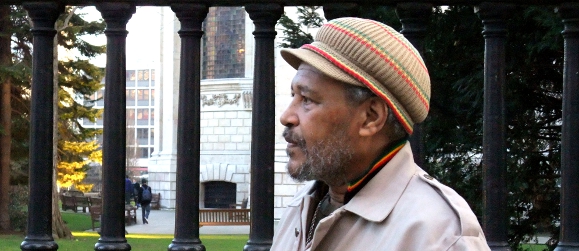
How did you become involved with the 12 Tribes organisation and band?
I'd known about 12 Tribes since '68. At the time I was Nyabinghi and the Nyabinghi concept is that we don't "join" because anything that is joined can be broken. So I didn't join until '72 and then we used to go up on Friday nights to the HQ and it was just people gathering together playing drums, singing and chanting. There was one big piano and you'd have four or five people on the piano singing the same song. So from there the headman said, "I want a band. Time to start the band" and the room became as empty as it is now! Everyone took off! So he said, "Will YOU do it?" and I said, nervously, I would do it. So we started the band in '75 and we started doing stageshows. The night we played the first show was at Bob Marley's house and that's when he joined 12 Tribes that same night.
Did you consider repatriating?
Well I've been back and forth to Ethiopia a couple of times and I'm setting up a business down there. Hopefully it will happen!
Who played in the 12 Tribes band?
There were two bass players when it started - myself and Errol Bagga Walker. But Bagga was more involved with Jimmy Cliff's tours and because of that he fell out of grace with our set up. When you have stageshows you have artists and you have theme songs. Theme songs that 12 Tribes liked that were like our spiritual songs. So we decided, "OK, let's do it this way: artists section is one show, and theme songs another show". So I was at first playing the artists section and Bagga was playing the theme songs so it was a rotation thing. During my period of time I played on that Fred Locks album, Black Star Liner. Also Israel Vibration was founded then and I helped to form them. But when it rotated and Bagga was doing the artists and I was doing the theme songs, it didn't last very long after that because he refused to sit down and learn the basslines that I had laid down before. He was just going and playing willy-nilly so Apple from Israel Vibration said, "Look man. If you not gonna play the bassline I'm gonna walk off the stage!" so I had to get involved and say, "If you gonna walk off - don't walk on!" Then everything went haywire and Israel Vibration left 12 Tribes.
Tell me about the solo work you recorded with 12 Tribes musicians.
Well Albert Malawi was always my drummer outside on the street anyhow but he just happened to be part of 12 Tribes as well. Then a few of them like Glasses and Everton Carrington were 12 Tribes musicians, but it wasn't like the 12 Tribes band was there. Because for my outside work, most of my keyboards were done by Dennis Fearon, who was called Jah D, and also Bobby Kalphat. You see, my studio band was called Blood Red It and Friends so the times they didn't label us "somebody's All Stars" you might see Blood Red It and Friends on the label. That was my studio band that I used to work with mostly.
So after the Lee Perry sessions what was the next Junior Dan tune you released?
I didn't do a lot of releases after the Lee Perry sessions because I had planned to bring all the music together with the 12 Tribes as the Jamaican version of Motown. But it didn't happen because the minute we started gathering, everybody wanted to be first. Everybody wanted to be a superstar and it crashed and fell down.
So for example tunes like Give Thanks No Skanks, which you co-wrote with Fred Locks, or Wise Man when and how were they recorded?
That was recorded while I was still working at Lee Perry's but I recorded it at JIS studios - the Jamaican Information Service. We'd sneak in after hours. I'd known Fred since the Randy's days with the Lyrics. Wiseman was at JIS as well in about '75-76. All those tunes were done there up to '77. Jah Foundation and Red Gold and Green - I think those were done at Scratch's you know?
Augustus Pablo is credited as being involved with some of these tunes. It's on the Honest Jon's website. Was he?
He has never played on one of my songs. I had to correct the Dub Store because they put up my thing and said, "Augustus Pablo and Junior Dan" and I was like, "Excuse me!" This is what I'm telling you. These people come up and tell lies. Honest Jon's interviewed me on tape like you're doing and I don't know where the hell he got that information from! I have played on about 85% of Augustus Pablo's records and he has never played a note on any of my recordings. And released songs with his name on it that I did. That's why we fell out.
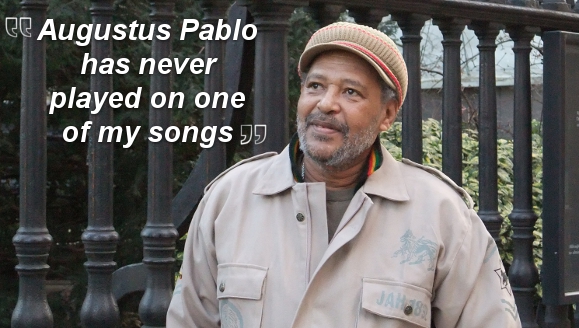
Because he released Jah Foundation on Greensleeves?
Yeah. And when he did it I was on tour with Burning Spear. I did Jah Foundation in 75-77'. I started touring in with Spear in '78 and by that time I had all these songs done and was thinking of doing a release. But because of the plans I had with 12 Tribes who were setting up a major company I didn't release it.
Pablo said, "Hey Leftie, I have a thing going here. Do you have anything you want put out?" and I said, "Yeah put out that" and then I was gone. I just gave Pablo the tape. Then two years later I was like, "Hey Pablo - you put it out?" and he said, "Yeah yeah it came out on Greensleeves". So I said, "What's it like?" and he said, "Oh I don't know you know..." and was like, "OK, when you back to England could you check it out for me?" and he said, "Yeah yeah yeah". So when he came back from England I asked him if he checked it out and he was like, "What?" So I said, "You haffi get a statement or something" and he said, "Nah you have to go do it yourself!" I was like, "How you mean? The guys in England don't know me. I've never been to England in my life. I'm supposed to take a plane, go to England, knock on this guy's office door and say it's me and give me my money???? I cyaan do that. It's up to you!" And we fell out on that point.
Now you play the Glockenspiel on that track. And you also, like Pablo, played the melodica on several tunes. How did you get involved with those instruments?
I did the Glockenspiel on so many songs out there because I was one of the only people in Jamaica that was playing one in the studios. It's on Fred Locks' album and quite a few others. The melodica was what I used to take up to the hills because at one point I was living in a cave for 18 months in the hills in Pinnacle in '71-72 where I had only my melodica and my acoustic guitar. I used to work most of the songs out on the melodica and you may notice that even the chord structures I use come from working them out that way.
So next you finally put out an album of versions to some of these tunes KTW Dub on Clappers. What happened there?
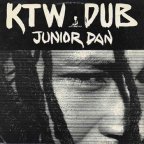 Same story as with Pablo. KTW was supposed to be my first vocal album. I first started recording it at Harry J and Bob Marley came in one day and heard it and said, "Look man, I have to finish producing this for you. Don't give it to nobody. I will deal with this". But I fell out with Harry J and destroyed all the tapes because I couldn't take them out and so I went to JIS and re-recorded everything there. But just before we got around to voicing them, Bob passed, so I went to Chris Blackwell because he had heard them before. He called me up to his office in New York and he said, "Yeah, I'm gonna put this out after Third World". So it would have been Bob, Third World, then me and then Black Uhuru. But when I came out of his office, Lester, who was his PR at the time, asked me how it went and I told him Blackwell liked it. He said, "Listen, I have a likkle label setting up. Why don't you give it to me? Give it to a black Jamaican not this white guy" and all that. So I thought, why not? Let's give him a try. I gave him a photograph and my tape and, believe me, I've not seen him since that day! His numbers changed and all ways of getting touch changed. And when I finally saw the album I saw all kinds of names on it I didn't recognise. Like Dave Zang on guitar. Who the hell is Dave Zang? Then I remembered it was Clayton Downey whose nom-de-plume for guitar was Dave Zang. Clayton Downey's name is down on the Skull's Black Slavery Days as producer. Now just the other day I was talking to Black Skull and he's very upset because the first release of that album was not authorised.
Same story as with Pablo. KTW was supposed to be my first vocal album. I first started recording it at Harry J and Bob Marley came in one day and heard it and said, "Look man, I have to finish producing this for you. Don't give it to nobody. I will deal with this". But I fell out with Harry J and destroyed all the tapes because I couldn't take them out and so I went to JIS and re-recorded everything there. But just before we got around to voicing them, Bob passed, so I went to Chris Blackwell because he had heard them before. He called me up to his office in New York and he said, "Yeah, I'm gonna put this out after Third World". So it would have been Bob, Third World, then me and then Black Uhuru. But when I came out of his office, Lester, who was his PR at the time, asked me how it went and I told him Blackwell liked it. He said, "Listen, I have a likkle label setting up. Why don't you give it to me? Give it to a black Jamaican not this white guy" and all that. So I thought, why not? Let's give him a try. I gave him a photograph and my tape and, believe me, I've not seen him since that day! His numbers changed and all ways of getting touch changed. And when I finally saw the album I saw all kinds of names on it I didn't recognise. Like Dave Zang on guitar. Who the hell is Dave Zang? Then I remembered it was Clayton Downey whose nom-de-plume for guitar was Dave Zang. Clayton Downey's name is down on the Skull's Black Slavery Days as producer. Now just the other day I was talking to Black Skull and he's very upset because the first release of that album was not authorised.
I've seen that as credited to Jack Ruby.
Yes it's all over the place. Jack Ruby was nowhere around! (laughs) Nowhere in sight! If he was in the picture then he gave Downey the tapes and stayed in St Ann's because he never came to the studio once during the recording. Black Skull said he never knew the album was released. He came to New York in 1994 and he saw it at VP. They took him to the store room and he saw his records piled to the ceiling and they gave him two boxes. That's all he ever got from that. Then Downey gave it to Mark at Honest Jon's to re-release a couple of years back, all without the consent of the artist. Now Black Skull is asking me to go the PRS to see what I can do about it. As for the music from that album, Downey called me and called Malawi a couple of times saying, "I have this album and I want you to help put this together. It's an all-of-us production". That's how it got done. Black Skull said he heard Downey got the tape from the Chin brothers in St Ann's. That's Andy Chin and his brother, the big exporters, and he claimed that Andy Chin had the tape. So I don't know what happened, I just know what we did. We went in the studio with Downey, we did it and he took it off. The next thing I hear it's all over the place. At least they still put my name on it! (laughs)
Now by this point the 80s were about to begin. Did these bad experiences put you off music for a while?
I left Jamaica in 1980 and didn't come back until '88. I went to Madison, Wisconsin. I left because the music had started to go on like a dog chasing its own tail and I was like, "No, I need it to go forward a bit". So I went to America and decided to stay in New York for a while, where I met up with Garland Jeffries who is an American pop singer. I did a couple of songs for his album and he wanted me to tour with him but I didn't want to because they were more pop and rock and roll madness. I did a few things with Kwame that ended up at Phillip Smart's studio, and I did a few things with Ken Boothe while in New York. Then myself, Jackie Mittoo, Noel Alphonso and Randy Butler had a band called The Jatalites, not The Skatalites! (laughs) We used to play quite frequently at some jazz clubs in Manhattan and the Village. Then I left New York and went to the midwest to Madison because New York was not a nice feeling. It was too much of the gun thing and I didn't like that. So I went up to a reservation and lived there for a while with the Indians. The Chief gave me this bracelet (shows bracelet) which he said was the tribal chief's bracelet. He gave it to me instead of his son because his son was on drugs. Anywhere I go now, if the Winnebago tribe see it they'll know who I am. I had an apartment in the city but I stayed on the reservation most of the time. I just came to the city when I needed to do the family domestic and then would back off again.
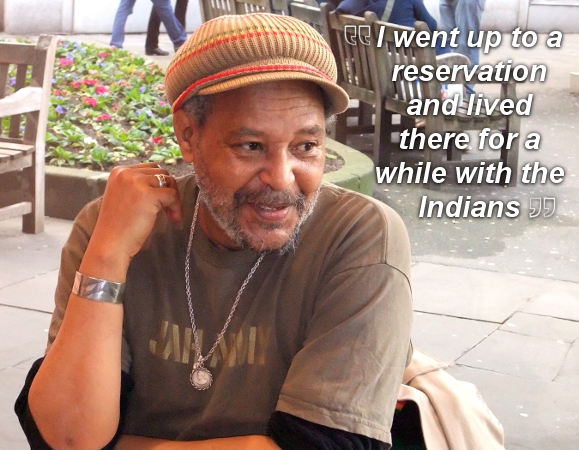
Was there any music going on at the reservation?
No, it was more writing and learning about a different side of life. I learned a little more than basic survival skills, how to live with nature. But in America I did start my band, the Jah Light band, doing tours all over the place for a while. Then I decided I really wanted to get back to Jamaica so I decided to learn ceramics and make a company out of that. So I moved back to Jamaica hoping to do that - I bought all the equipment I needed and everything - but Jamaica is tough nuts! I went down there and lost my equipment in the airport and when I got it back it was damaged all over - it was no fun. So I came to the UK in 1996. When I first came here I lived in Manchester for the first year. Then I came to London and lived in Brixton for about two years. But West London, that's my space!
How did you become involved with Damon Albarn and Honest Jon's?
I got involved with Honest Jon's through Damon. I was working at JetStar and this guy came into the studio and said, "Hey, there is a BIG pop star that really want to meet you you know? I'll take you to meet him man come..." and he didn't tell me who he was. So I went to Damon's studio and almost put my foot in it! Because when Damon is working on songs he doesn't actually sing it like he sings on records. He played me something and said, "Do you think we should work on this? What do you think we should do?" and I nearly said, "I think we should put a singer on it first!" but something in my head said, "Don't go there!" So I said "I think we need a riddim in it. Bigger. Fatter" and he said, "OK come down here and we'll start tomorrow". So I went down the next day and we did four songs and then he ran out of the studio and came back with about five guys in suits with attaché cases saying, "these are the top guys from EMI". Apparently they knew about me before - I don't know how it was done - but they knew about me before I got there. They all met me and then he said, "We have to re-record this whole album now because the way you took those three or four songs makes all the rest sound rubbish now". So we did that.
And that was the first Gorrilaz album? So how from there did Honest Jon's come to release your JIS works?
Yeah, it was. Basically, Damon came to me and said, "EMI wants to sign your stuff but I'm going to give you an option. I have a friend, Mark, who has a record shop thing going on and is more in the roots reggae market than EMI" and I could see that as being so. So he said, "Sign them with Mark and then EMI will buy from Mark" and I said, "OK whatever, I'm giving you access and you do whatever you want". And that's the way it was done.
Damon plays a bit of melodica himself. Did you play together?
Not on the recording we did, no, but yes in person. I think he had one before he met me but the one he's playing now I bought for him. The melodica you buy depends on the kind of sound you're looking for because you have the soprano, the alto, the tenor and so on. The ones I used to play in the early days were the tenor. It was big and it had a tube - that's what I used to play for all those early songs. But after being around Pablo, I got the smaller one, the soprano.
So do you think Honest Jon's helped make your works available to a much wider audience?
Yes, I will give them the credit for opening it up in other areas and that is good. But what happened is, just before Honest Jon's put that record out, I was preparing to release my new album. And it possibly would have gone in the same medium because I was in good graces with them so they would have been willing to buy it off me. But since they haven't bought one of my albums. Not one. I brought one round for them to listen to a sample and haven't heard anything more. But that's cool.
So tell me a bit about your new album Reggae Roadmap. It's only your third ever album release...
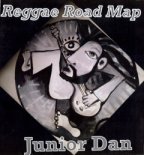 It took me two years to complete because I wanted everything in it to fall in to place. I didn't want to create the music - I just wanted it to fall in place. I didn't want to sit there and just write, write, write. I wanted to be just walking down the street and say, "Oh yeah" and then go home and put that thought in it. I think I called it Reggae Roadmap because I wrote all of those songs on the road. Like Babylon Wars for example, I wrote at the Vatican, whereas Ethiopia Calling I wrote in Addis. So in the different places I go, I get different inspirations from the place and then write a song there.
It took me two years to complete because I wanted everything in it to fall in to place. I didn't want to create the music - I just wanted it to fall in place. I didn't want to sit there and just write, write, write. I wanted to be just walking down the street and say, "Oh yeah" and then go home and put that thought in it. I think I called it Reggae Roadmap because I wrote all of those songs on the road. Like Babylon Wars for example, I wrote at the Vatican, whereas Ethiopia Calling I wrote in Addis. So in the different places I go, I get different inspirations from the place and then write a song there.
You play quite a diverse range of instruments from many different countries on the album: the Krar from Ethiopia, the Kora from West Africa, the Ukelele, the Bazouki and so on. How did you become interested in these sounds?
I'm just interested in sounds - full stop. Anything that gives a different sound or different variations on the same note, I am interested in hearing. There's an album that will come out that I recorded a few years ago where I play the sitar as well. Music for me is about making a sound! (laughs)
Would you say that the mainstream reggae scene was a bit too conservative for you? Your own music seems a lot more experimental that what you laid down for the big producers.
Yes. My music is the music I really want to express. I have a strong fondness for, I don't want to say classical music, but music with innovation. Different movements, different chords, changes of tempo - I like that kind of stuff. I think reggae is a medium that can put that straight out there. But most reggae productions are done by producers who are actually executive producers and not music producers. They come in to the studio and tell you, "You hear the sound Dennis Brown did last week? I want you to make something like that now". That's why I left Jamaica because it's like a dog chasing its tail all the time. You get one song that comes out and makes a hit then you get 30-40 people making the same thing. I don't like that personally. I like to be creative.
Do you think the sound system culture drives that conservatism?
Yes. The sound system culture and also the so called "roots collectors". Since I got to England and been talking to some of these guys and I've been cussing them even though they are my friends. My problem is this: I'm here, me, you have my song, you love my song. But because I made this one last week, you don't want it! These so called collectors help the exploiting producers to exploit the musicians even more. Those records they are running after to collect were done for producers during the time when the musicians were young, coming up, and didn't know much about the business. This is what these so called collectors hang on to. When the guy is struggling out of that captivity and he's on his own doing his own thing they are not supporting him because his record is in the year 2010 and they want the one from 1970.
Record collectors are always suspicious of anything that isn't a decade old. But isn't there a more technical reason for this tendency though? Haven't the artists sacrificed the use of lots of musicians for synthesisers and drum machines so that they can control their own music? Isn't that why the collectors don't want to buy?
But what would help them to get those musicians in would be a bit of support from the people buying the records right now! "This is not up to the standard man! We want live music!" "Okay so buy the flipping record now so I can go hire some live musicians!" These people have the talent for making music but most of them (and I'd include myself in that) know nothing about the business or cannot get their business going. So if they press up a thousand records in their basement somewhere what they need is for you to buy that off them so they can go make some good music. I'm not talking about each and every one of them because a lot of artists now I don't consider them artists. I just call them music people. They come in, go on a jive and make some money from it. But there are real true musicians who write good music and like to make good music and they do not have the opportunity because there is no financial support. They're trying to find food for their kids at home. Thanks to the level that the music has gone to now, hornsmen and percussionists don't get any work. So how can you expect someone like Tan Tan to come out with an album now? He doesn't have the money so he can't get to the studio.
Which is why some of the best roots reggae albums of recent years featuring horns and percussion were created as a friendship thing.
That's the only way.
Going back to sound system culture for a second, there isn't much of a hard drum sound to your record. Did you deliberately want to get away from that?
I wanted it to be mellow. When I do the seven inch music it's going to have the hard drum sound because you have the version. But for the album I personally created it so that people could sit back and listen to it instead going and jumping in the dancehall. Especially because of the kids of lyrics I put on it - I want people to listen to them.
Why would you say you've released so few albums in such a long career?
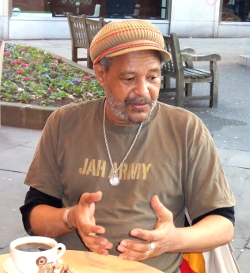 Because mostly I was working for other people. And during the big period of time when I should have been putting out a lot more music, I deliberately held it back to build around the 12 Tribes project. It was not until 2001-2002 that I started to decide, "You know what? That's not happening. I'll make this happen". Right now I have five complete albums sitting there waiting to go out. My problem is money. This one - Reggae Roadmap - I put out because I did a lot of moving up and down to get the money for it. As we speak I am still trying to get the money to pay for the cds which should come out next week. So that's how it is. I need money. I have to be living, paying bills and expenses and then putting money aside to do these projects.
Because mostly I was working for other people. And during the big period of time when I should have been putting out a lot more music, I deliberately held it back to build around the 12 Tribes project. It was not until 2001-2002 that I started to decide, "You know what? That's not happening. I'll make this happen". Right now I have five complete albums sitting there waiting to go out. My problem is money. This one - Reggae Roadmap - I put out because I did a lot of moving up and down to get the money for it. As we speak I am still trying to get the money to pay for the cds which should come out next week. So that's how it is. I need money. I have to be living, paying bills and expenses and then putting money aside to do these projects.
What music are you listening to these days?
(laughs) Ah, I'll tell you the same thing Bob Marley told me and it took me years to understand: "I don't listen to music". I remember saying, "What you mean you don't listen to music?" and he said, "When listen to other music I'd be turning mine off! I'd be listening to theirs and letting it influencing me". So, myself I have taken on quite a bit of that. I don't listen to a lot of music. I will go on myspace and visit a friend's page and hear what they've got going on now but I'm not really into listening to a lot of music. Especially considering that a lot of it is one man made computer music. I'm biased against that! (laughs)
You don't think that technology can help music?
I think technology can help music to an extent because of those five albums I have sitting there, two were made on a computer. So I use it and I think I use it pretty well because I did quite a few productions for Jetstar using it. But for me personally, for my music and what I have to say, I don't want it on a computer. If you come to me and say you have an artist to produce and you'd like me to do it in this studio here I'll do it. I'm not anti computer. I just don't want it on my music now. Maybe it will come again - who knows? (laughs)
What advice would you give young musicians coming up now?
Practice. Practice your instrument. Because when you practice your instrument it opens areas you don't know exist. When was learning about harmonies and chords I did a little brainwashing on myself. I had an acoustic guitar leaning up in a corner, and you know those bubble makers like you see at a go go show? I took one of them, took off that part and tied some rubber bands on it. I turned it on and it started spinning and due to the speed the rubber bands would extend and play the guitar all night. And when I heard how the harmonies and the sounds went together it opened up a channel for me. Just having that guitar there, touching this string, touching that string, it was holding a chord at random. So practice your instrument and new areas will open.
Do you have a final message to your supporters?
The message is love. You should love everybody and that starts with yourself because if you don't love yourself you can't love anybody else. If you own my new album and you read the spoken word piece I included on an A4 sheet of paper inside, on that I say the main thing that causes division and separation in this world is religion. Religion is the master of confusion. My advice is not to consider people because of their religion or their cultural way of life, but accept and deal with people as you would like them to accept and deal with you.
PLEASE NOTE: THE VIEWS EXPRESSED HERE ARE THOSE OF JUNIOR DAN AND DO NOT NECESSARILY REFLECT THOSE OF ANGUS TAYLOR OR UNITED REGGAE.
Photos copyright Angus Taylor 2009
Reproduction without permission of United Reggae and Angus Taylor is prohibited.
Read more about this topic
Comments actually desactivated due to too much spams
Browse by categories
Recommended Articles
Latest articles
Recently addedView all
© 2007-2024 United Reggae. All Rights Reserved. Reproduction in whole or in part is prohibited. Read about copyright
Terms of use | About us | Contact us | Authors | Newsletter | A-Z














